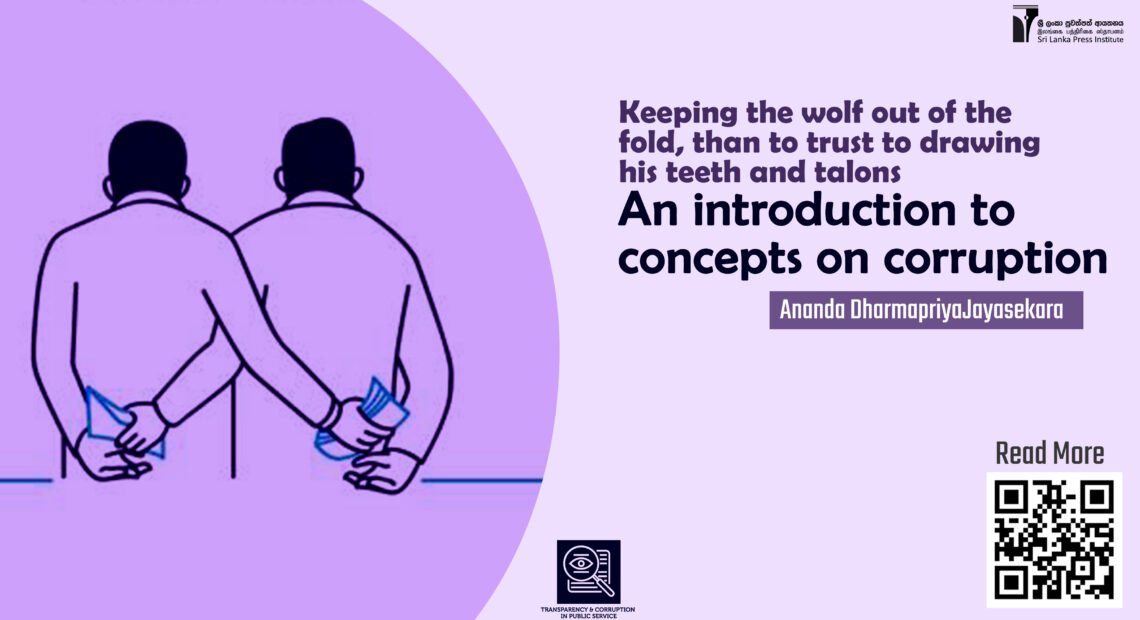
Keeping the wolf out of the fold, than to trust to drawing his teeth and talons An introduction to concepts on corruption
Ananda Dharmapriya Jayasekara
“The time to guard against corruption and tyranny, is before they shall have gotten hold of us. It is better to keep the wolf out of the fold, than to trust to drawing his teeth and talons after he shall have entered.” This is a famous quote of the third President of the United States of America Thomas Jefferson (1743-1826) who was a brilliant lawyer, architect and philosopher.
When we consider corruption, we observe that many of the states in the world still fail to keep the wolf out of the fold and they try to draw its teeth and talons after it has entered. However, the nations like New Zealand, Denmark, Finland and Hong Kong have successfully curbed the menace although they too have failed to totally end corruption. However, these states have disproven the idea that corruption is incurable. They strengthened the institutional and legal structures, promoted transparency and accountability and mobilized public activism and awareness to fight corruption successfully.
The aim of this brief article is to comprehend corruption and to discuss the necessity of defeating corruption that has embraced many developed and developing nations.
What is corruption?
The history of corruption is as old as the history of humans. Corruption is closely knit with power and governance throughout history. According to Buddhist ten governance principles (Dasha Raja Dharma), the king is responsible for acting against corruption and ensuring a corruption-free rule and.
Kautilya’s book on economics, Arthashastrha, written in 400 BC highlights the difficulty of investigating the corruption of the public officials. “Just as it is impossible to know when a swimming fish is drinking water, it is impossible to find out when a government servant is stealing money,” Kautilya stated.
There are many definitions on corruption but no single definition is universally accepted. When the initiation of the UN Convention Against Corruption was being discussed in 2002, it was decided not to define it and to discuss its forms and practice under several main concepts. The reason was the definition of corruption changing from culture to culture and from nation to nation.
However, several definitions of corruption may help to understand the phenomenon.
Oxford dictionary: dishonest or fraudulent conduct by those in power, typically involving bribery.
Mariam Webster dictionary: dishonest or illegal behavior especially by powerful people (such as government officials or police officers
World Bank: the abuse of public office for private gains
Transparency International (an international network of organizations that fights corruption): the abuse of entrusted power for private gain
According to these definitions, in a broad sense, corruption does not limit to the public sector. It is spread both in the public and private sectors from small scale to mass scale.
Sri Lanka has clearly defined corruption in in article 70 of Bribery (amendment) Act of 1954 No. 11 amended by Act No. 20 of 1994. However, the definition is limited to the actions of the public officials, and the anti-corruption activists discuss the need to broaden its scope.
Various forms of corruption
Corruption can be categorized as bribery, frauds of public funds, deceit, random taking and misuse of powers. ‘Bribery and corruption’ is a term often used together, but bribery is part of corruption.
Grand corruption and petty corruption
Grand corruption is the corruption in the higher echelons of government. VAT scam and the fraud related to the bonds of Central Bank of Sri Lanka are two examples.
Petty Corruption is the corruption that takes place in the administrative level of policy implementation. The bribes the citizens have to give to the public officials to obtain services are examples of petty corruption.
Types of corruption according to the UN Convention against corruption
According to the UN Convention against corruption, the governments must introduce laws to penalize the below mentioned acts of corruption.
Bribery
Bribery is the illegal transaction of gratuity. The aim of this transaction is unduly influencing to a decision or an action. The briber either provides, wishes to provide or promises to provide some benefit in return of his/ her expectation. Bribery transactions occur based on mutual understanding. The relevant gratification can be made in advance or after the delivery of the task. The gratification may include cash, goods, stakes, vehicles, internal secrets, sexual gratification or any other benefit. The bribe may be given for not doing something as well. Requesting a bribe, offering a bribe as well as trying to solicit a bribe are equally offensive before the law.
International Monetary Fund (IMF) estimated in its 2016 report that bribery alone might cost 1.5 to two billion US dollars.It is 2% of the global GDP. According to the thedefinition of corruption as per article 70 of Bribery (amendment) Act, corruption is the misuse of power by a public official for undue gains personally or for another person and causing a loss to the government.
Misuse of property
Fraudulent acquiring or misuse of property, state of personal funds, guarantee or any other valuable thing under an official’s custody for personal gain or any other person’s benefit.
Coercion
Acts performed with the intention of obtaining benefit from state administration or authority.
Misuse of office
Misuse of the position or title by a public official.
Being wealthy unduly
A public official deliberately amassing wealth in ways he/she cannot explain as legal.
Money laundering
Money laundering is conversion of a property earned in illegal means into money hiding the unlawful source of income generation.
Corruption can be further categorized as fraud, coercion, internal trade, misuse of decision making powers, undue bias, illegal gratifications and nepotism.
American academic and economist Robert Klitgaard has explained the factors that cause corruption and described how they impact on the fluctuation of corruption levels.
He points out that corruption triggers when a public official has discretionary powers in an authoritarian background in which he is not made accountable.
Dr. Klitgaard pointed out that reduction of authoritarianism and discretionary powers and increase of accountability must be focused to minimize corruption.








